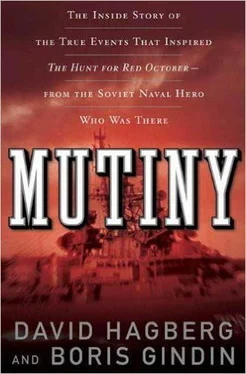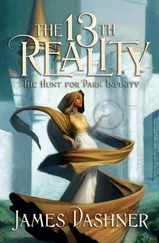But soon after they submerge, Ramius murders their zampolit, Captain Second Rank Ivan Putin, because he is the one man aboard who could stop the mutiny in its tracks. Ramius makes it look as if the zampolit’s death was an accident so that the part of the crew not in on the plan will not become suspicious. It’s Ramius’s intention to sail his boat out into the open Atlantic, eluding detection by his own navy until he can somehow make contact with the U.S. Navy, ask for asylum for him and his crew, and offer his boat as a prize. The story hinges on a letter Ramius posted to his uncle Admiral Yuri Pedorin back in Moscow before Red October sailed, stating his intention to defect to the West. This, of course, leads to the massive hunt for Red October by Russian as well as U.S. and British military forces.
But as all good stories must, Clancy’s hinges on the personalities of the crew. Among them are the first officer Gregoriy Kamarov, who would like to marry a round American woman, live in Montana, and raise rabbits; his chief engineer, who is a chain-smoker and a mechanical genius; the ship’s surgeon, the timid Dr. Petrov, who believes they should turn back; and a KGB ringer who works undercover as an assistant in the galley.
So it begins, Ramius thinks to himself, as must the mutineer aboard the Storozhevoy that morning after the parade in Riga, because this story also hinges on a message sent to Moscow and on the personalities of the crew. Every Russian warship has its zampolits, its chief engineers and first officers and captains and ordinary seamen, each with his own story, which, taken as a whole, as Gindin maintains, are the links that forge the bonds among them.
Even under a rotten system that nearly everyone in the Soviet Union hates, guys like Captain Potulniy and Firsov and Gindin, who love the Rodina and are perfectly willing to give their lives in her defense, are not uncommon. And that’s a double-edged sword, a crying shame, because the Communist government is an omnivorous psychological monster that not only depends on this nearly religious devotion but also feeds off it, even nurtures it. Russians place great faith in their families, because for most of them little else is of constant value in their lives. They can depend on almost nothing. Most of the officers get married right out of the academy, because they want the comfort of their own family, but this usually is a mistake, because Soviet sailors go to sea on six-month rotations and when they’re in port they’re humping their butts working on base. Junior officers have very little time for their families, so the divorce rate is very high. This leads to widespread alcoholism, low morale, and wholesale cheating at every turn. Hell, the system is cheating them; why not cheat back? Nothing else makes much sense.
Because of this, Soviet officers are just about like officers everywhere, always thinking about getting drunk and getting laid, both at the same time, if possible. The big difference is that Soviet officers, probably more than officers of any other country, also think about their families and Mother Russia, both at the same time.
Gindin remembers that in the summertime he and his father used to go mushroom picking. Boris was nine or ten years old the first time. The factory where his father worked would pick up its employees around four in the morning to take them a couple hours outside of Pushkin into the woods. Boris’s mom packed their lunches and sent them each off with a kiss, because they would be gone the entire day.
“I remember the feeling when we broke for lunch, dead tired from getting up so early and spending four hours looking for good mushrooms, opened our bags, and found boiled eggs, bread, kielbasa, tomatoes. It tasted so unbelievably good, even with our hands dirty from mushrooms.”
Those days were the happiest of his life, and standing at the rail on the Storozhevoy’s deck in Riga the morning of the mutiny he can’t help but remember. Unlike most of his academy classmates, he hasn’t gotten married yet, so he’s not pining for a wife and children, only for his father, Iosif, who died four months ago.
“When we came back home, I would go to bed exhausted, but my mom would stay up most of the night sorting the mushrooms, getting them ready to cook and pickle and marinate and dehydrate to make into soup later.” It makes Gindin melancholy that he’ll never see his father again. “We would bring back several buckets of mushrooms in those days. My mom used to fry them with potatoes for us. I loved those trips with my dad. I loved being with him. It was fun.”
Scratch a Russian, so the proverb goes, and you’ll find the dark, rich soil of the land just beneath his skin and flowing in his veins.
The Gindins had a small piece of land not far from where they lived, which was given to them by Iosif’s employer, where they planted potatoes and some other vegetables. In the middle of September they would harvest several bags, each about thirty kilograms, which lasted them at least through the winter until spring. There wasn’t much meat, so suppers of herring and boiled potatoes were the norm, but no one complained.
It was the Russian way.
This was in the sixties, when in the West the Beatles were coming to America, Detroit was turning out millions of big-finned, massive, gas-guzzling cars, McDonald’s was going head-to-head with A&W, and JFK and Jacqueline were creating a Camelot in which the young president told his fellow Americans not to ask what your country can do for you but ask what you can do for your country.
In the meantime, life in the Soviet Union was a harsh reality. What’s truly sad for Boris is that his father had worked hard all his life but had practically nothing. A small apartment, outdated furniture, hand-me-downs, and even if he had worked for ten lifetimes, he would never have been able to buy a car.
But Boris is basically a happy person. Nobody else had anything, so the Gindins never worried about it. In those days they couldn’t know that a lot of teenagers in the United States had cars, but even if they did it wouldn’t have mattered. It was all propaganda anyway. Soviet sailors were the best sailors on earth. Their navy was the best equipped, the best-run military service on the planet, with the finest officers, the most dedicated men, and therefore the highest morale.
“Besides, we were defending the Rodina.”
Despite all that, Boris is not a stupid man. Even as a kid he understood that his only path out of the grinding poverty in which he was raised was to get accepted in a military academy and become an officer. The pay was very good, and the privileges were fantastic. As a civilian, no matter his profession, his pay right out of college would only be 100 to 120 rubles per month. It didn’t matter if he became an engineer or a doctor; the pay was all the same. But Gindin’s pay in the service is 300 rubles per month, plus free meals aboard ship, free uniforms, and when the ship visits any international port the officers are paid in hard currencies.
Nor were Soviet women stupid. They knew that if they married an officer, they could have lives of luxury beyond the reach of most civilians.
At the academy where Boris studied engineering for five years, girls paid to get into dances on campus, trying to snag a young cadet. Some of the girls weren’t so good-looking. It was sad to see the same ones year after year not able to convince a cadet to marry them. But the prize was worth the effort.
He and his friends went over the fence from the academy whenever they got the chance, risking a lot of trouble by going samovolka, or AWOL, because the girls in town would do literally anything to get officer candidates to marry them. If you wanted to get laid you went samovolka, because the dances on school grounds were closely supervised. No alcohol, no hanky-panky, everything aboveboard. No fun whatsoever.
Читать дальше












